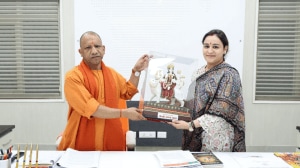Knowledge panel gets report on law education
Put contemporary issues and international laws in legal curriculum, teach professional ethics...

Put contemporary issues and international laws in legal curriculum, teach professional ethics, make internships mandatory, encourage law graduates to teach and research, introduce dual degrees foreign universities8217; partnerships, fund research centers, ask senior lawyers to offer good compensation to young graduates and above all, rate Law Schools in the country. These are some of the key recommendations of the National Knowledge Commission8217;s working group on legal education, headed by Justice Jagannadha Rao, former Supreme Court Judge and Law Commission Chairman, which submitted its report recently.
The recommendations are expected to be adopted by the NKC in a two-day meeting on October 14 and 15. The report8212;a copy of which is with The Indian Express8212;says 8220;the Bar Council of India BCI has granted permission to a large number of law schools which are maintaining very poor standards and have very poor infrastructure. Several of these colleges are located in remote places, some times not even in the district headquarters. The faculty and library facilities in several of these law colleges are very much deficient. The Bar Council teams inspecting the facilities appear to have failed in their work8221;.
It further says, 8220;Most of the 700-odd law schools do not compare well with the standards and curriculum in the present age. Faculties in these law schools is limited because they are either large in number in one place or are located in remote areas in the mofussil where sometimes there is not even a District Court.8221;
The NKC8217;s panel has reasoned that after liberalisation in 1991, 8220;the entire concept of legal education has changed8221;. 8220;Today, legal education has to meet not only the requirements of the bar and the new needs of trade, commerce and industry but also the requirements of globalisation. New subjects with international dimensions have come into legal education. There is also an enormous need for non-practising law graduates in trade and commerce. It is also necessary to allow engineers, chartered accountants, scientists and doctors to qualify in law for non-practising purposes.8221;
Today, there are about 11 National Law School Universities NLSUs where students are selected through an all-India competition, but the report says, 8220;this alone is not sufficient for our purposes and we have to raise the standards of the remaining 700 odd law schools8221;.
As regards curriculum, the report recommends modules on globalisation, environmental concerns, new technology, shifting government policies, trade trends, corporate movements, new and prevailing foreign investment avenues, changing labour and employment policies should be included in the curriculum so that the graduating generation of lawyers can swiftly relate to the real world.
- 01
- 02
- 03
- 04
- 05































